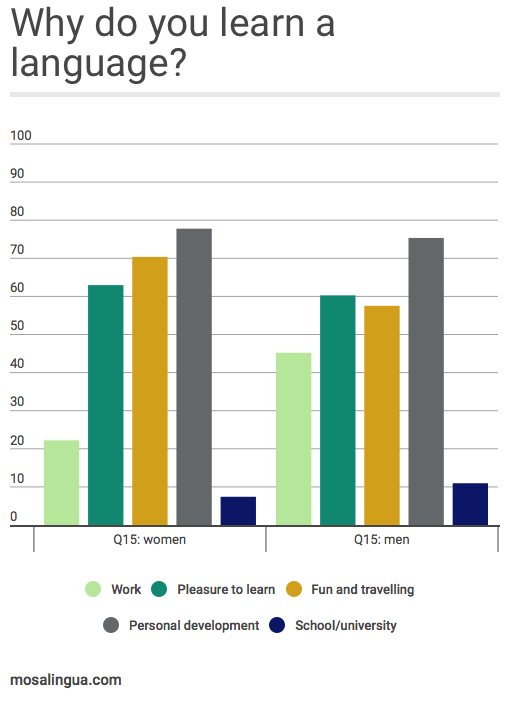“Women are literary and men are mathematical”,
“Women have better communication skills than men”,
“Women are more gifted than men in language learning”…
Seeing these often-cited statements might not surprise you, since they’re things we get used to hearing. And there is a MULTITUDE of preconceptions out there, perhaps stereotypes, that involve the differences between men and women, intellectual differences being the most common. These ideas also work their way into language learning, the field we’ll look into the most today.
But what is actually behind all these stereotypes? If it’s possible that a bit of truth lies behind every joke, could we also tell ourselves that there’s at least some truth lurking behind these stereotypes on the intellect of men and women? Are women better with learning languages than men?
Tomorrow being International Women’s Day, this is what we’ll try to figure out.

Are Women Better At Language Learning Than Men?

To quote the words of Rebecca Rogers*: “in 1789, studying English and Italian (was) suggested since these two languages could possibly help develop women’s reasoning”. Young women had to spend at least an hour a day studying these languages or a quarter of their time devoted to its instruction. And the “modest occupation of translator” was another skill women excelled at (according to Necker de Saussure). Languages were clearly a huge part of the young bourgeois woman’s education. Why? Because, as perceived by Necker de Saussure, this skill was a way to cultivate “intelligence in its entirety”. Perhaps this is true, but nothing is said on the abilities of women when it comes to language learning (our hot topic today, mind you). With translation profession needs changing, women started learning Mandarin, Arabic, and many other useful languages for business. Mandarin may not be easier to learn for those that are not amongst the Chinese people or Chinese culture, but as the most spoken language in the world, its translators are quite valuable today.
And it continues: the female polyglots!
Today, this phenomenon is everywhere. Women continue to learn languages and they are seriously over-represented in the below-mentioned literary paths. For instance, of France’s 95,540 liberal arts and sciences students, 70.1% are women. Of the 110,813 language students, 74.1% are women. And of the 7,286 double-major students, languages and social sciences, 74% are women. And we can find the same statistics in other European countries.
According to the same author, Rebecca Rogers, “language is the most feminized field in public secondary education”. But whether this large feminine presence in the linguistic fields is due to each sex’s intellectual skills in these particular area, a trait or, quite simply, due to a matter of preference is yet to be determined.


A matter of preference, of wanting to compensate for an inferiority in mathematics, or of nature vs. nurture… these are of little importance.
The fact is that the phenomenon of the female polyglot is nothing new. And it’s ubiquitous to this day.
(Great) women like Ellen Jovin, linguaphile and polyglot with no less than 20 languages under her belt and Judith Meyer, author, language specialist and hyper-polyglot (13 languages!), are proof of this. Both tremendously enjoy each language they learn and come off sounding like a native speaker.
Our women readers, why do you all learn to speak English? MosaLingua asks its readers.
In continuing our part on this debate, MosaLingua created its own little user survey to understand our users’ reasons and motivations for learning and the long term problems they come across when learning languages (a way to get to know each other).
According to this survey:
- 37% of women use MosaLingua several times per day compared to 30% of men (which isn’t all that bad…)
- Women mainly learn languages for the pleasure of learning (at 62%), for fun and traveling (70%) or for personal development (77%), whereas men mainly learn languages for work (at 45% compared to 22% for women) and for schooling (at 10% compared to 7%).
If I were to jump to a conclusion, I would say that women learn for themselves and that men learn for the “need” to, but is this really jumping to conclusions?
Women are better than men at learning languages? Actually, maybe they’re just different…
So there it is, all this is fine and well, but really it comes down to skills.
If you go off Education First’s English Proficiency Index*, women truly are better than men in Latin America (as well as all over the globe), scoring 51.56 to the men’s 50.96. In the Middle East and North Africa, the disparity goes as high as 46.22 to 43.48. Worldwide, women have 53.40 to 52.08 for men.
And believe it or not, this is a passionate subject (not just for MosaLingua). Tons of linguists have worked on the question. And for the majority of them, it really isn’t our gender that awakens our abilities to learn a new language, but it simply comes down to the learner’s social environment and culture. Even if the EPI index does find women to be better than men at language learning, what we can take out of it is this: Above all, the main issue is learning methods. When you delve into the question a little, and take a look at where linguistics are at today, you realize that men and women just don’t work the same way. Two studies are worthy of noting for this.

Likewise, the second study also showed a difference in learning methods but more on the tools used. In fact, according to the international and university journal Porta Linguaraum, studies conducted in Europe, Asia and Latin America all arrive at the same conclusion: women use different learning elements for language learning, such as reading and writing, and different elements of the language, such as vocabulary and pronunciation. Men, well they most often limit themselves to just one method, one tool.
Will these studies prove that women are more gifted than men with languages? Do they clearly demonstrate a difference in the intellectual abilities between men and women? Well, no. All they really show is that men and women work differently … even when it comes to learning. So yes, there are more women taking literary and language classes in college. But this may also show that men and women have different tastes, desires and professional ambitions. And we’ve already discussed the phenomenon of the female polyglots…just as well as we could have discussed the phenomenon of the male polyglots! When it comes down to it, we’re all equal in the language learning ranks – and different in our operation. War of the sexes remains undeclared.
*Les femmes dans l’enseignement des langues vivantes : éléments pour une histoire à construire, by Rebecca Rogers. Université de Marc Bloch, Strasbourg.
*INSEE Study, 2014, “Etudiants inscrits en Université par discipline”.
* EF EPI, EF Index of English Proficiency 2015
Related posts:
Start learning a new language today

Good news: we can help!
More good news: you can get started for free! Start your free trial now and for the next 15 days, take advantage of the most effective language learning method on the market!
Vocabulary flashcards, videos with subtitles, audiobooks, articles adapted to your level – with MosaLingua Premium (Web & Mobile), you’ll have access to all this and more. Get started right now. It’s free—and risk-free—to try!



![Interview with Lydia Machova on the Biggest Language Learning Mistakes [VIDEO]](https://www.mosalingua.com/en/files/2017/08/23-300x169.jpg)

Comments